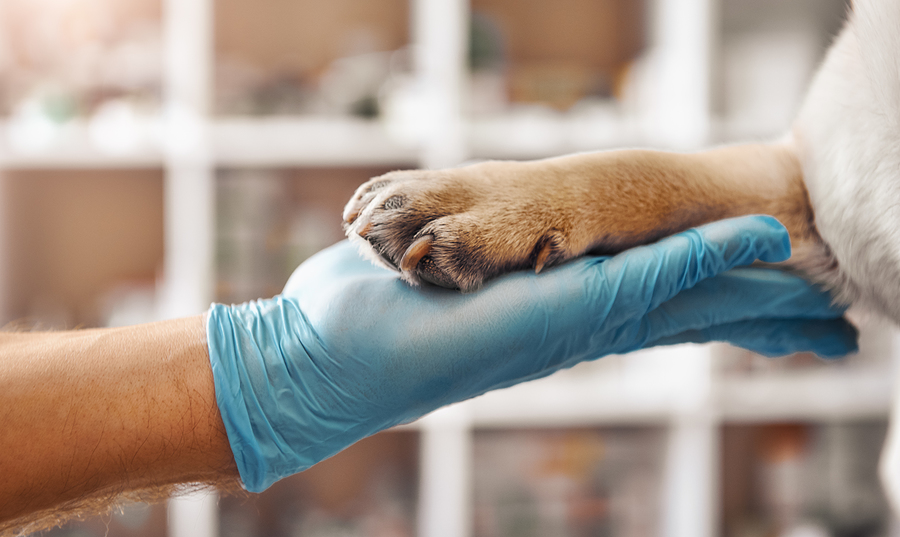Most of our pets will need to undergo anesthesia for a surgery or other procedure at some point in their lives. Puppies and kittens have spay or neuter surgeries. Dental cleanings are also common. Other surgeries might include wound repair or removal of a skin tumor, correction of a cruciate tear. or any number of surgeries based on your pet’s needs. Most surgeries are completed without complications, but as a pet parent you will want to understand what your pet will experience and ensure that they have the best of care.
Here’s a brief overview of what to expect.
Your pet will either be admitted as a day patient or stay a night or two at the clinic, depending on the surgery. Your veterinarian will likely give your pet calming medications to reduce their level of fear, anxiety, and stress. Your veterinarian may also place an intravenous catheter in either a front or hind limb. A small amount of hair will be shaved from the site where the catheter is placed to allow for sterile preparation of the area. This catheter will be used to administer medication and/or fluids and will be removed before you pet goes home. Pain medication will be administered before, during, and/or after the surgery to keep them comfortable. Your pet may also receive medications to prevent them from vomiting and allow them to get back to eating sooner and/or they may receive antibiotics. They will also be monitored throughout the procedure.
Here are some questions that you can ask your veterinarian so you can be fully informed about your pet’s procedure:
-
- Why does my pet need this operation?
- Are there other treatment options, and is this operation the best option for my pet?
- What are the risks, benefits, and possible complications for this operation?
- Does my pet’s current health and medications affect the outcome of the operation?
- Will you perform the operation? Could you tell me about your experience with this operation?
- Do you perform this operation regularly?
- What are the possible complications that can occur?
- If you are not performing the operation, can I meet the surgeon that will be operating?
- How much will the operation cost, and are there insurance options or other payment options?
- Who will anesthetize my pet? You can ask to meet these individuals.
- Will my pet need any blood tests or other tests prior to surgery?
- What medications do I need to give my pet the night before and/or morning of the operation?
- How do I feed my pet the night before and morning of the operation?
- Should my pet have free access to water the night before and morning of the operation?
- What time do I need to bring him/her to the clinic?
- What will anesthesia be like for my pet?
- Will you provide calming medications to keep them from being fearful, anxious, and stressed?
- Will my pet receive medication to prevent him/her from vomiting?
- How will complications be treated?
- What pain medications will be used?
- How will my pet be monitored during the operation?
- What other measures will be taken to ensure that my pet is comfortable?
- How long will the surgery take?
- When should I expect a call with an update on my pet’s surgery?
- Should I plan to pick up my pet the same day of surgery? If not, can I come visit my pet each day until they come home?
- What can I expect for my pet’s recovery?
- How should I expect them to act when they get home?
- Will they need any medication such as antibiotics or pain medication?
- Should I feed my pet once they arrive home? If so, what do I feed them and how much? If not, when should I expect that my pet will want to eat?
- When will they be able to return to their regular activities (walks, play, other exercise)?
- Will the surgical site need any special care? If so, will you provide the materials?
- Will my pet need physical therapy?
- What should I look for that would indicate that my pet is painful after surgery?
- What signs indicate that my pet is healing well?
- What signs indicate that my pet might be having problems after surgery?
This may seem like a lot of questions, but the more information you have about the surgery, the more confident you will be that your pet is getting the best possible care.
This article was reviewed/edited by board-certified veterinary behaviorist Dr. Kenneth Martin and/or veterinary technician specialist in behavior Debbie Martin, LVT.
![]() This article is brought to you in collaboration with our friends at Zoetis Petcare. TI-05718
This article is brought to you in collaboration with our friends at Zoetis Petcare. TI-05718








